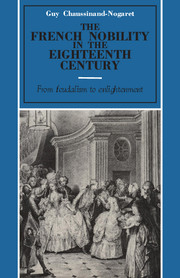Book contents
- Frontmatter
- Contents
- Introduction: the gilded ghetto of royal nobility
- 1 The Enlightenment and noble ideology
- 2 The nobility between myth and history
- 3 Plutocrats and paupers
- 4 The fundamental divide: culture
- 5 The nobility and capitalism
- 6 Rites and strategies: the marriage market
- 7 The nobility against the Old Regime
- 8 A plan for society
- Conclusion
- Afterword to the English edition
- Notes
- Bibliography
- Supplementary bibliography
- Index
4 - The fundamental divide: culture
Published online by Cambridge University Press: 05 June 2012
- Frontmatter
- Contents
- Introduction: the gilded ghetto of royal nobility
- 1 The Enlightenment and noble ideology
- 2 The nobility between myth and history
- 3 Plutocrats and paupers
- 4 The fundamental divide: culture
- 5 The nobility and capitalism
- 6 Rites and strategies: the marriage market
- 7 The nobility against the Old Regime
- 8 A plan for society
- Conclusion
- Afterword to the English edition
- Notes
- Bibliography
- Supplementary bibliography
- Index
Summary
At the end of the old regime divisions according to length of nobility or its degree of dignity, which so obsessed Saint-Simon, were in fact negligible beyond a certain social level. At Court, newcomers mingled with members of the oldest houses and the highest in dignity. The quarrels over precedence which had taken up so much of the time of dukes and peers at the Court of Louis XIV were now only exceptional occurrences. The hierarchy had stopped measuring itself by exclusive reference to divine right.
With the defeat of polysynodie the peerage was forced to give up any ambition to control the state, dukes confined themselves to positions of honour, and the secretaries of state, those ‘petty persons’ or ‘nonentities’ (that is, holders of recent nobility), recovered the power they had wielded at the height of Louis XIV's reign. The Court had lost its heavenly image: the Father in the full splendour of his glory, the princes of the blood-royal standing as the model of the Son, sharing His being, and the peers, the elect, mediators and grateful intermediaries between the Father and his people. This Court, at once medieval and modern, presented a Biblical picture of a King-Father who was lofty and an object of fear, but who was humanised and as it were democratised by the glory he had granted to the peers of his realm, chosen by his will alone from among the most trusty and deserving of his people.
- Type
- Chapter
- Information
- The French Nobility in the Eighteenth CenturyFrom Feudalism to Enlightenment, pp. 65 - 83Publisher: Cambridge University PressPrint publication year: 1985



